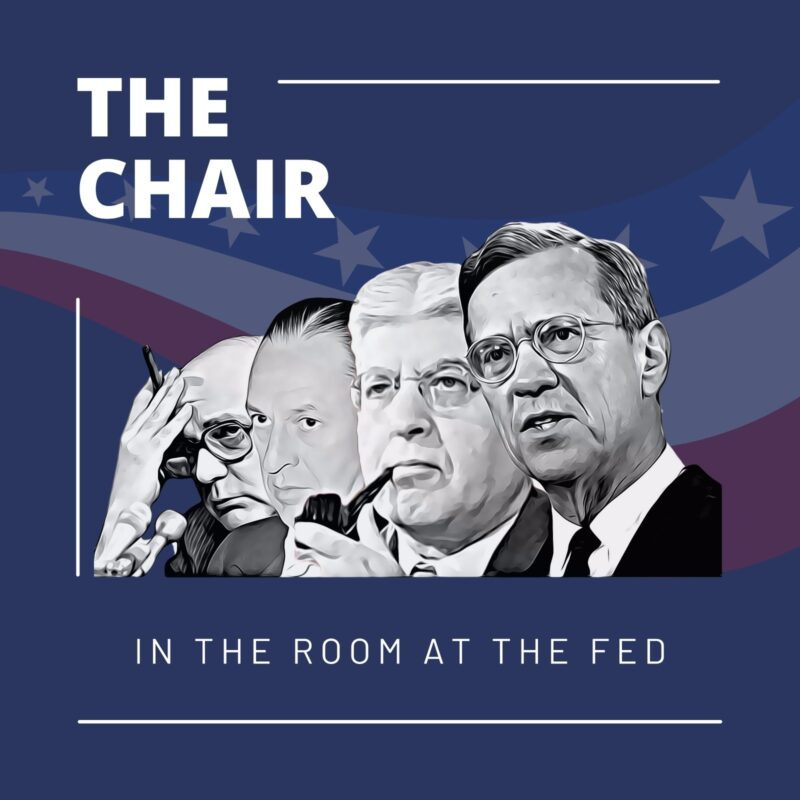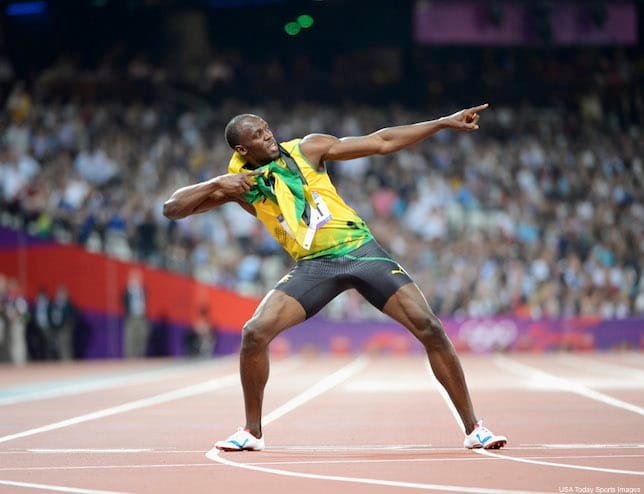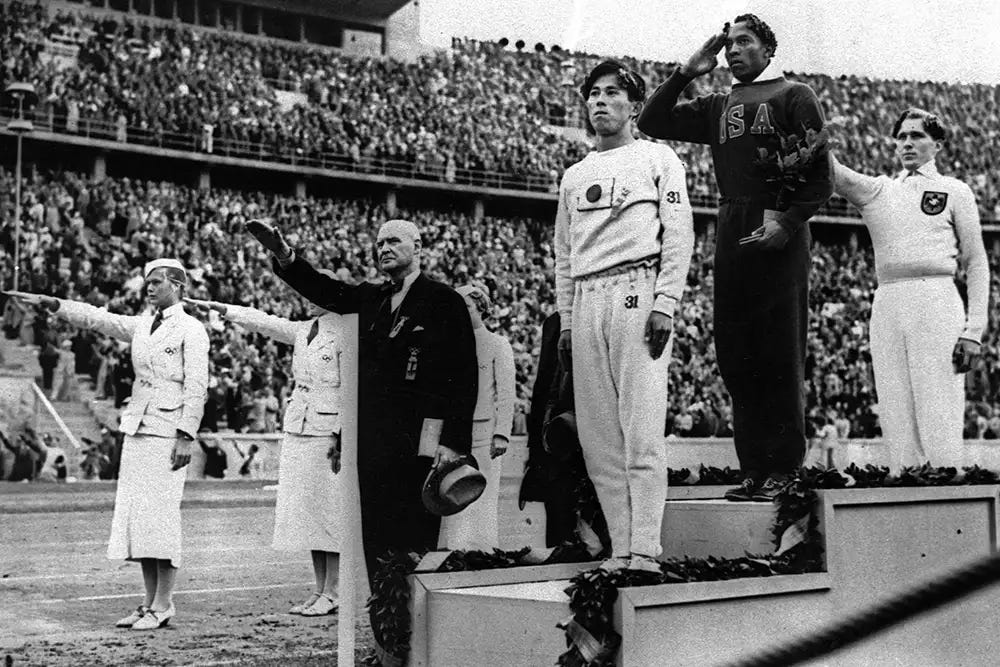Golden Games: Three Podcasts on the Olympics and a Special 4-Part Series on the Federal Reserve
Also, announcing our 2nd book swap in NYC on September 16th!
The Chair: In the Room at the Fed
New Books Network is releasing a new, four-part series on the history of the United States’ Federal Reserve. The Federal Reserve or “the Fed,” is the central bank of the United States and the most important financial system in the world. The Fed sets the monetary policy for the United States and the US Dollar, the world’s de facto reserve currency. Composed of 12 regional banks and a headquarters in Washington, D.C., the Fed’s key body is the Federal Open Market Committee (FOMC). The FOMC’s 12 members are led by a chairperson, an important figure who wields significant power over interest rates and the stability of the banking sector.
In the past week, the current chairman, Jerome Powell, has received enormous scrutiny for his decision to hold interests rates at a 23-year high. Since 1977, achieving maximum employment and avoiding inflation have been the twin mandates of the Fed. With a weak jobs report and inflation hovering at 3%, Powell and the FOMC find themselves in a difficult situation. The decision at hand: stay the course and continue to fight inflation or lower interest rates to avoid a recession.
With so many variables at play, the Fed Governors typically look towards the history of their institution as a guide. Crucially, the resolve, personality, and wisdom of the chairperson often dictates whether or not the global economy will slip into recession or pull off a soft-landing. There is no doubt, Jerome Powell is thinking deeply about the legacies of past chairs like Marriner Eccles, William McChesney Martin Jr., Arthur Burns, and Paul Volcker.
Listen below to learn about this important institution and read our interview with host Tim G. Jones.
Tim G. Jones is the lead European macro policy analyst for Medley Advisors, an advisory service for institutional investors, covering the European Central Bank, the 2007-15 Eurozone financial and debt crisis, Brexit, and the pandemic. In 2020, he started podcasting on Europe and economics for NBN and— following Russia's full-scale invasion of Ukraine— launched the twenty4two Substack newsletter.
Q: Why did you decide to make this four-part series, The Chair?
A: The first thing I should say is that I hope the four-part series is popular enough to justify another four parts to bring it up to date. I've covered the European Central Bank since before its creation, and I've long been frustrated (not quite enough to write one, I must admit) by the lack of fly-on-the-wall books about the ECB. Apart from a couple of memoirs and two semi-official policy histories, there has only been one journalistic book (only available in Italian). By contrast, since Alan Greenspan took over its chairmanship, the Federal Reserve has become a regular theme for books that opened up the human and "political" (in its broadest sense) side of monetary policymaking. I love “insider books,” and I wanted to make a series about them - covering the terms of the four people who have chaired the Fed board during my professional life: Greenspan, Ben Bernanke, Janet Yellen, and Jerome Powell. As I was preparing for this, I stumbled across four books covering the mandates of the four change-making chairmen before Greenspan: Marriner Eccles, Bill Martin, Arthur Burns, and Paul Volcker. Once I got hold of these authors and their books, I couldn't resist making a pre-series.
Q: Why focus so closely on this one institution and its chair?
A: The importance of the Fed in financial markets can be exaggerated. It's the US that is the critical factor more than this one institution. That said, the Fed's decisions and how it communicates its intentions to make or not make those decisions drive markets more than any other institution. That may sound a bit esoteric but essentially it sets interest rates and currency values for consumers, businesses and governments all over the world. The Chair isn't always influential; there's a reason I've picked eight out of the Fed's ten chairs who have served since 1934 and none of the seven before that. But those I have picked all made their mark on the job. They were foundational in setting the Fed's operating philosophy, its communications style and theory, and in defending (or not) its independence from government.
Q: Who are the chairmen you profile, and who do you find most fascinating?
A: In this series, I profile Eccles, Martin, Burns, and Volcker. They're all compelling. Eccles: because of the strange mixture of his Mormon multi-business background and his hardcore Keynesianism. Burns: because he was the original "Maestro" who couldn't stop meddling in every aspect of policy. Volcker: because of his self-harming obsession with public service and his hard-won policy success. But it was Martin who stood out to me, partly because he felt forgotten despite serving so long in the role, but also because of the new things that happened under him: the development of expectations management and the politicization of board appointments.
Q: With weakening economic growth, expectations are high that the Fed will start lowering interest rates very soon. Why does the Fed have so much power over the economy and what are the advantages and disadvantages of this concentration of power?
A: As a European, I'd argue that the reason monetary policy has outsized importance in the US is because of the under-developed welfare state. The European macroeconomic model has many faults, but one advantage most countries have is that much of the burden for slowing growth is assumed by generous unemployment benefits and free (or almost-free) healthcare. This makes perfect management of the cycle by the central bank less important. It is more important in the US and, as a result, more politicized. Aside from its role in maintaining financial stability, the Fed's role is to anticipate the shape of the business cycle and the ebb and flow of consumer-price inflation and make the cost of credit higher or lower depending on those assumptions. The Fed has been compared to a blind man in a dark room looking for a black cat which isn’t there. I'm more amazed that they get it as right as they do compared to their mistakes.
Book Swap #2 in NYC on September 16th
After the success of our last book swap, we have decided to host another in New York City (Manhattan, location TBD). Like before, entry is free with a book. Come schmooze, swap, and take home some free books from our generous press partners!
Three Podcasts to Understand … The Olympic Games
The summer and winter Olympic Games never fail to generate excitement. While the sporting spectacles themselves are the focal point for many fans, the events are only one part of the vast process of picking the host city, building the infrastructure, planning the opening ceremony, and managing the geopolitical and cultural tensions. Seldom do the games proceed without some scandal. To unravel the complex history, we present three New Books Network episodes to understand the Olympic Games.
Bidding for the 1968 Olympic Games: International Sport’s Cold War Battle with NATO
Heather L. Dichter’s history of the bidding process for the 1968 Olympic Games is an excellent investigation of how political conflicts can complicate sporting events. It follows the tensions between NATO and the International Olympic Committee (IOC) and showcases the diplomatic negotiations that influence Olympic planning. For much of the Cold War, NATO followed the Hallstein Doctrine, which essentially sought to prevent international recognition of East Germany. This included travel restrictions for East German athletes and a ban on the East German flag or anthem, which collided with the apolitical stance of the IOC. Dichter’s story shows how the international visibility of sports made the Hallstein Doctrine a public relations issue for NATO and presented East Germany with an opportunity to legitimize itself on a global stage. For more episodes on the political side of the Olympics, check out The Olympic Games, the Soviet Sport Bureaucracy, and the Cold War: Red Sport, Red Tape and Power Games.
The Olympics that Never Happened: Denver '76 and the Politics of Growth
The strain put on host cities by the vast increase in tourism and need for appropriate infrastructure is nearly always a subject of controversy. But in 1976, it came to a boiling point when a coalition of activists in the Denver area united to oppose the awarding of the 1976 Winter Games to the Colorado city. Adam Berg’s history traces the dishonesty of the Denver Organizing Committee in charge of the bid, the formation of the opposition, and the eventual referendum that opposed publicly funding the Games. The coalition of activists that prevented Denver from becoming the host city—a diverse mix of urbanites, environmentalists, and local politicians—shows the breadth of the Olympics’ impact on a city. It also highlights the Olympics’ potency to shed light on issues beyond the Games themselves: many of the opposition leaders hoped to use the publicity of its rejection to draw more attention to other issues like affordable housing. Overall, Berg’s impressive story illustrates the complex relationships between the Olympics and the people who call the host cities home.
Celebrate Winter: An Olympian's Stories of a Life in Nordic Skiing
John Morton’s memoir recounts the many years he spent as a coach, athlete, and fan of Olympic Nordic Skiing. Celebrate Winter gives us an on-the-ground look into the exhilarating experience of being at the Olympics. Part history of Olympic Nordic Skiing and part autobiography, Morton tells several stories about his experiences from the Olympics, like spontaneously attending a US-USSR hockey game that ended in a surprise win for the Americans. Alongside these stories, Morton reflects favorably on the attention that less mainstream sports like Nordic skiing have received and explains the impact of participating in the Olympics on his own life. Altogether, Morton’s account conveys the ethos of persistence, pride, and camaraderie that the Olympics brings out in athletes and fans alike.
If you enjoyed these episodes; the New Books Network has several more on the Olympics and a large selection of sports podcasts. Learn about all the contours of sports, from soccer’s impact on international relations to the relationship between sports and art.









